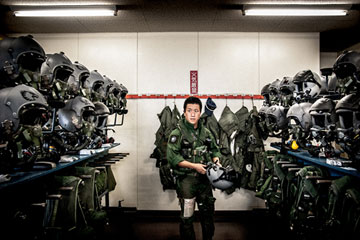
These days, Japanese pilot Kohta "Vader" Araki, who flies F-15s, is always on alert.
(2 of 4)
Yet unlike the U.S., which has enjoyed relative goodwill in the region, Japan's relations with some of its neighbors are still poisoned by the decidedly unpeaceful, undemocratic way in which it tried to fashion a Greater East Asia Co-Prosperity Sphere more than seven decades ago. Animosity lingers because, unlike Germans, Japanese politicians can be equivocal about the nation's wartime guilt. Also, leaders in China and South Korea, countries especially brutalized by Japan, profit politically from stoking anti-Japanese public sentiment. "The phantom of militarism is rising once more in Japan," warned an August editorial in the People's Daily, a Chinese Communist Party mouthpiece. Even the U.S. — which is treaty-bound to defend Japan in case of attack, maintains military bases in the country and presumably isn't averse to someone else needling China for a change — seems wary. "U.S. policymakers have sent clear signals to Abe that a further drift to the nationalist side is not welcome," says Koichi Nakano, a politics professor at Sophia University in Tokyo.
Still, Abe's combative stance has won him some surprising allies. He has strengthened economic ties with nations like India and Burma that are keen to hedge against China Inc. Southeast Asian nations are looking to Japan to counter China's growing military might, even if they once suffered under the boot of the imperial Japanese army. A Pew survey released this summer found that about 80% of Filipinos, Indonesians and Malaysians regard Japan positively.
In July, Abe received a warm welcome in the Philippines, where Japanese soldiers had presided over the murderous 1942 Bataan death march. Manila is embroiled in its own territorial conflict with Beijing over disputed isles and shoals in the South China Sea, a vast waterway that China claims as nearly all its own. Abe came to town with promises of 10 cutters to upgrade the Philippine coast guard. In September, Japanese warships docked in Philippine ports, followed by U.S. armed forces who conducted joint war games with their Philippine counterparts. (In the early 1990s, U.S. military bases in the Philippines were closed because of local opposition, but the current government has indicated interest in a renewed American military presence.) "Japan has every right to enhance its military capability due to China's provocation," says Clarita Carlos, a former president of the National Defense College of the Philippines. "The Chinese are always playing the we-were-colonized-by-the-Japanese card. All of us have been there. We do remember, but we also know how to forgive."
Security Fixation
Besides forgiveness, Japan needs revival. The country has been wounded by more than two decades of economic stagnation, and was hit hard by the 2011 earthquake, tsunami and nuclear crisis that claimed nearly 20,000 lives. Abe, who during his first stint as Prime Minister in 2006 became the nation's youngest postwar leader, has projected himself as a bold changemaker. Since taking office again in December, he has launched a reform program, dubbed Abenomics, that aims to use monetary expansion and fiscal stimulus to goose Japan's long-deflated economy. In September, the national mood was buoyed when Tokyo was awarded the 2020 Olympics, despite international concerns over radioactive water leaking from a tsunami-damaged nuclear power plant. "I want to make the Olympics a trigger," Abe said, "for sweeping away 15 years of deflation and economic decline." In a February speech in Washington, he proclaimed: "Japan is back."
Indeed, the LDP's slogan is "Restore Japan," and Abe has explicitly linked any economic recovery to Japan's ability to protect its sovereignty. "Japan's beautiful seas and its territory are under threat, and young people are having trouble finding hope in the future amid an economic slump," he said in September 2012, as the Senkaku-Diaoyu row with China heated up. "I promise to protect Japan's land and sea, and the lives of the Japanese people, no matter what." This year, Japan's defense budget increased for the first time in 11 years — by a paltry 0.8%, yes, but a clear signal from the Abe administration of the importance it places on national security. In August, the Defense Ministry requested a 3% rise in next year's spending, which would be the biggest jump in more than two decades.
Despite the SDF's constitutional limitations on any offensive use of force, Japan already boasts the world's fifth largest defense coffers. This summer, the Defense Ministry unveiled the Izumo, Japan's biggest warship of the postwar era, which resembles an aircraft carrier; plans are afoot to form a new amphibious corps of soldiers and a fleet of surveillance drones. Abe is also pushing for the formation of a Japanese National Security Council. On Sept. 17, he made a plea for the rhetorically tortured concept of "active pacifism," or collective self-defense, in which Japan can come to the aid of its military allies should they come under attack. The liberal newspaper Asahi Shimbun editorialized: "[Collective self-defense] would represent a radical departure from the basic security policy principle of postwar Japan and a gross deviation from its pacifist creed."
